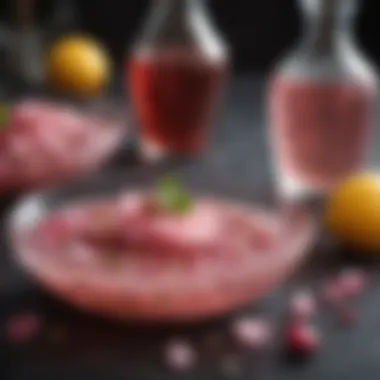Exploring Rose Water: Culinary Uses and Benefits


Intro
Rose water has traversed through time, establishing its roots in several cultures, primarily originating from the Middle East. Traditionally, it has been utilized for its fragrant allure and enticing flavor. Yet, its uses go beyond just decoration of desserts or flavor in delicacies. As culinary practices evolve, the application of rose water is gaining nuanced recognition among chefs and home cooks alike. This article aims to reveal the numerous applications of rose water in the kitchen.
In this exploration, we break down practical recipes, culinary techniques and health benefits you can reap by incorporating this aromatic ingredient into everyday meals. Rose water stands as a sophisticated addition that enhances not only the flavor but also the aesthetic value of your dishes. With this dual perspective—between taste and health—you can elevate your cooking.
Recipe Overview
- Creative Dish Name: Rose Petal Infused Rice Pudding
- Portions Yielded: Serves 4
- Time Required: 30 minutes prep, 30 minutes cooking
- Difficulty Level: Easy
- Main Ingredients:
- Arborio rice
- Rose water
- Milk
- Sugar
- Chopped pistachios
- Dried rose petals (optional)
Step-by-Step Instructions
To create this delightful dish, follow these steps:
- Prep Ingredients: Rinse 1 cup of Arborio rice thoroughly in cold water until the water runs clear, reoving excess starch. Gather the other main ingredients: 4 cups milk, 3/4 cup sugar, 3 tablespoons rose water, and garnish items like chopped pistachios and dried rose petals.
- Cooking the Rice: In a medium-sized pot, combine the rinsed rice with the milk. Place the pot over medium heat, and stir occasionally to prevent it from sticking. When it comes to a gentle boil, reduce the heat to low.
Intro to Rose Water
In the expansive realm of culinary enhancement, rose water stands out as a remarkably nuanced ingredient. Its incorporation into various dishes transcends mere flavor; it contributes subtle aromatics and depth that can transform a simple meal into an indulging experience. Many culinary enthusiasts have yet to fully explore its potential. This introductory section aims to illuminate the significance of rose water in cooking, emphasizing its unique characteristics, benefits, and practical considerations.
Definition and Composition of Rose Water
Rose water is essentially a distillate, produced from the steam distillation of rose petals. This process yields a fluid that possesses a fragrance and taste reflective of the roses used in its preparation. Composed chiefly of water and essential oils, it retains slight polysaccharides that offer a viscous texture. The primary chemicals responsible for the scent and flavor are phenyl ethyl alcohol and a host of other aromatic compounds. This potent combination allows rose water to impose its mark on an array of culinary practices without overwhelming the dish.
Historical Significance of Rose Water in Culinary Traditions
Historically, rose water goes back thousands of years and is deeply rooted in several cultures. Its use is documented in ancient Persian and Islamic traditions. In medieval cooking, for instance, rose water was not just a luxury item but an essential ingredient in various savory and sweet dishes.
Culinary practices that include rose water often reflect a cultural lineage. For example, in Middle Eastern cuisine, it adds an essential note to dishes like baklava or rice pudding, while in South Asia, it brings balance to sweets like gulab jamun. It is important to recognize the versatility of rose water, as it can serve both ceremonial and everyday culinary purposes. Its journey through time highlights the enduring human appreciation for the delicate and refreshing essence that rose water provides, paving the way for its resurgence in modern gastronomy.
The historical context of rose water reveals a profound culinary legacy, with diverse applications across cultures. Understanding this legacy enriches one’s appreciation for the ingredient.
Culinary Uses of Rose Water
Utilizing rose water in cooking opens up a diverse range of flavors and textures. This topic highlights the versatility and benefits of integrating rose water across various culinary practices. While often associated with sweet dishes, it has potential in savory contexts as well. Its aromatic properties can enhance both taste and presentation. Adopting rose water into modern cooking trends embodies a blend of tradition and innovation.
In Baking and Pastry
Flavor Enhancement in Cakes
Rose water can elevate cakes by providing a delicate fragrant note. Many bakers prefer this touch, as it offers a distinctive flavor profile that separates their creations from standard recipes. The unique characteristic of rose water is its flavor; it's sweet, floral, and can complement existing ingredients. It is especially a popular choice for wedding cakes and other festive occasions, delivering subtlety to each slice.
One advantage of using rose water lies in its ability to stay fresher over time compared to other flavorings, keeping the finished cake aromatic for days, though care must be taken to avoid overuse as it may impart a soapy taste if added excessively.
Use in Pastry Creams
Incorporating rose water into pastry creams can enhance a traditionally rich dessert with an air of complexity. The main advantage is how it balances the creamy richness with its refreshing flavor that cuts through heaviness. This choice is especially beneficial in recipes for classic desserts such as éclairs or tarts, allowing pastry chefs increased opportunity for creativity.
The unique feature of rose water here is its lightness. It deepens flavor without overwhelming the palate. While beneficial, potential downsides include possible confusion among some diners unaccustomed to floral notes in their creams.
Rose Water Infused Cookies


Integrating rose water in cookie recipes introduces an unfamiliar yet rewarding flavor. Cookies baked with this ingredient stand out among traditional varieties. The major characteristic benefiting rose water cookies is the fragrant aroma that fills the kitchen while baking, turning an ordinary experience into something special.
One advantage is that many recipes require only a few drops to amplify taste, making this ingredient easily approachable. However, one must proceed with caution since bread-making exploits blonde flavors; too much rose water can overwhelm the entire batch—a clear risk in baking that must be mindfully managed.
In Beverages
Popular Rose Water Drinks
In a world seeking natural refreshing options, rose water gives a unique feel to numerous beverages. Common choices include rose lemonade and rose lassi. Its refreshing quality allows consumers new avenues to experiment with flavor at home or in cafes.
The main benefit of using rose water in drinks is the additional depth of flavor without unwanted caloric intake from syrups or excess sugar. People appreciate how it employs simplicity to craft rich tastes for enthusiast customers or culinary adventurers. Meanwhile, some find the inherent sweetness challenging, depending on personal preferences.
Pairing with Other Flavors
Pairing rose water with ingredients like lemon, mint, and yogurt creates refreshing blends appealing to diverse palates. Interestingly, it stands well against citrus notes without diminishing its floral aspects. This characteristic makes these pairings captivating in summer beverages and drinks served during special occasions.
A warming consideration is that exceptionally strong flavors might wash out the subtleties of rose water, thus requiring a careful balance of ingredients. For home beverage creation, foundational combinations, typically include righteous controls aiming to offer drinks enjoyable for communities or gatherings.
In Savory Dishes
Adding Depth to Salads
Salad dressings featuring rose water can balance acidity while softness can expand palate trail. People may appreciate its floral notes enriching oft-simple vegetable choices. This key note elevates dish chit-chat, invoking freshness that keeps diners engaged.
Its beneficial role in salads lies in creating a heightened sense of taste, especially in combinatorial salads, providing substantial nuance through flavors. Attention is also necessary because the innocuous flavor may get lost if paired with heavy dressings; an oversight to typically consider allowed illnesses closed contexts.
In Marinades and Sauces
Integrating rose water within marinades and sauces creates unique profiles that introduce significant taste. A token quantity mixed with lemon juice may tenderize meats while them taking on unfamiliar titular flickers. Resting the freshly routed pieces before cooking allows infusion to settle positively.
The character couple furthers its recommended path aside behalf evaporative sweets reused amidst ropes limited piquancy aspects in recipes uncertain. Thus well-enough thought outcome experiments with delicate flourishes o freight food wouldn’t trickling obsolescence plate layout anything valueless.
The inclusion of rose water in culinary applications is about the balance of flavors. Success lies in the careful experimentation rather than foreign displacement.
By understanding diverse methods to employ rose water, individuals nurture their cooking arsenal into a space of creative autonomy. The elegant perfume enhances culinary creations across multiple contexts, leading to explorers of flavor transcending dated established boundaries.
Health Benefits of Rose Water
Rose water goes beyond its fragrant aroma and culinary appeal. In recent years, many have become increasingly aware of its health benefits. These benefits enhance its utility in cooking, making it a favored choice among those seeking to marry taste with wellness. Examining rose water’s health contributions can empower culinary enthusiasts to make informed choices in their cooking practices.
Antioxidant Properties
One significant aspect of rose water is its rich content of antioxidants. Antioxidants are compounds that help counteract oxidative stress in the body, which is linked to various chronic diseases. Rose water contains flavonoids and phenolic compounds that exhibit robust antioxidant activity. This means they can combat free radicals, reducing cell damage that may lead to conditions such as heart disease and cancer. For culinary applications, this property can add not just flavor but also nutritional value, allowing affected individuals to enjoy their meals while also consuming healthy ingredients.
Anti-inflammatory Effects
Rose water is also recognized for its anti-inflammatory effects. Chronic inflammation can result in numerous health issues, including arthritis and digestive disorders. Studies have shown that the natural compounds found in rose water can alleviate inflammation. In practice, culinary enthusiasts can integrate rose water into recipes, such as salad dressings, to tap into this beneficial property. When consumed, it not only enhances flavor but may also contribute to better health outcomes.
Potential Digestive Benefits
Another often-overlooked benefit of rose water is its potential positive impact on digestion. Traditionally, rose water has been used in many cultures as a digestive aid. It may help soothe an upset stomach and even promote the secretion of digestive juices. For those looking to revitalize their meal options, adding rose water to digestive recipes, such as teas or infused water, can be an effective way to promote gastro health. Integrating this in cooking not only enhances flavors but also aligns with a health-conscious approach.
Key Point: Rose water presents several health benefits, including antioxidants, anti-inflammatory affects, and digestive support that can elevate culinary practices, marrying flavor with wellness.
How to Use Rose Water in Cooking


Understanding how to incorporate rose water in cooking is crucial for fully appreciating its potential. This fragrant ingredient adds a layer of complexity to dishes. Knowing the right quantity to use is essential for balance. Misjudging may lead to overwhelming flavors that can easily ruin a dish. Therefore, it becomes imperative for every chef—or even home cook—to master the art of measuring and balancing rose water in their culinary endeavors. Additionally, appropriate storage is essential to preserve its delicate aroma and flavor.
Determining the Right Quantity
When adding rose water to a dish, the right quantity can make all the difference. A little goes a long way; generally, one teaspoon adds a pleasant hint of flavor. In baking, it is wise to start small. Try just a few drops when you first experiment. Flavor is more pronounced when heated, hence baked goods will feel quite different after baking.
For savory dishes, you may want to start by adding a pinch—a very small amount—and gently increase that according to your taste. Balancing rose water becomes important. You do not want it to dominate your dish or lead to unintentional flavors. The wise rule is to
- Start small: In most cases, half a teaspoon is effective.
- Taste as you go: You can always add more.
- Use with strong flavors: Rose water blends nicely with spices.
Balancing Flavors with Rose Water
Balancing flavors in your dish while using rose water will ensure sophistication. It pairs majestically with sweet and spicy profiles. Consider the dish's overall ingredients when deploying rose water; some combinations flourish, while others may clash.
For instance, in desserts, extracting aromatic sweetness complements chocolate or vanilla well. Acidity from lemon or lime, particularly in dressings, contrasts nicely; thus, create harmony between floral notes and tangy flavors. Consider these pairings:
- Desserts: Chocolate, vanilla, and cardamom
- Salads: Lemon juice, mint, and yogurt dressings
- Savory: Spices like cumin and coriander can bring depth.
Make sure to taste regularly. It helps maintain a delicate balance. If you feel the rose water overpowers other ingredients, use acidity or spice to improve warmth and increase flavor complexity.
Tips for Storing Rose Water
The aroma and quality of rose water play a critical role in its impact on food. To ensure sustained flavor without compromising quality, proper storage becomes essential. A few key tips include:
- Seal it tightly: Always close the lid to minimize air exposure.
- Cool and dark place: Store in a cupboard or the fridge. Both could help retains its properties.
- Use glass containers: Glass keeps the contents pure, away from potential reactivity of plastic or metal.
A shelf life of rose water is often between six months to one year if stored and handled correctly. After that, it may start losing its flavor efficiency. Verify smell before using, as it can sometimes be spoiled quickly if the container breaches or is exposed to light for too long. Following these tips enables the enjoyment of rose water continually.
Rose Water Recipes for Busy Individuals
Integrating rose water into culinary practices offers many benefits, especially for those with tight schedules. It is an ingredient that can significantly uplift the blandest meal without vast preparation time or complex procedures. The emphasis on quick recipes resonates well with culinary enthusiasts who prioritize flavor and health while facing constraints on time. These recipes capture both convenience and elegance, showcasing how rose water can enhance a multitude of everyday dishes.
Quick Rose Water Infused Desserts
Desserts come to life with the addition of rose water. Busy individuals can whip up light and elegant sweets that require little effort. For example, you can make a simple rose water panna cotta. To start, heat dairy with sugar and 2 tablespoons of rose water until dissolved. The combination is then thickened with gelatin and chilled until set. The subtle floral note elevates the pudding, transforming it into an extraordinary finish to any meal.
Another option is rose water fruit salad. Cut up your choice of fruit such as apples, bananas, or berries. Toss them gently in a mixture of honey and 1 to 2 teaspoons of rose water. This blend not only enhances the natural flavors but also adds a dash of fragrance that fills the kitchen as you prepare it.
Simple Rose Water Salad Dressings
Using rose water in salad dressings transforms an everyday experience into something floral and refreshing. A straightforward vinaigrette can take moments to make. Combine 1 tablespoon of rose water with 2 tablespoons of olive oil and 1 tablespoon of vinegar. Mixing these components contributes a harmonious balance between sweet and tangy.
Another blend could include adding rose water to Greek yogurt with herbs as a creamy dressing. Just mix yogurt, 1 tablespoon of rose water, mint, and lemon zest. The creamy texture alongside floral taste provides sophisticated flair over simple greens.
Speedy Rose Water Beverages
Drinks infused with rose water are not only refreshing but also eye-catching. Take rose lemonade as an example. This requires fresh lemon juice, sugar, and 3 tablespoons of rose water mixed together with cold water. Just chill it and serve over ice for a cooling beverage that delights the senses and provides a comforting essence.
For a quick herbal tea, warm up water and steep your chosen herb such as chamomile. You can add 1 teaspoon of rose water to it before serving. The resulting beverage is calming and aromatic, ideal for winding down at the end of the day.
Using rose water in your culinary routines can demonstrate a unique flavor profile in your meals. It supplies delicate and exotic tastes without requiring complex skills or extensive preparation time. Facilitating such integration leads not only to richer dishes but also provides a seamless entry into the world of gourmet fun.
Each recipe or idea provided above emphasizes convenience while granting the option to elevate warrior meals. Busy dining enthusiasts can enjoy the benefits of rose water, enriching their culinary practices effortlessly.


Cultural Perspectives on Rose Water Usage
Rose water carries significant cultural weight within various cuisines around the globe. Its use extends beyond just taste enhancement; it embodies tradition, heritage, and deep-rooted culinary practices. Understanding these cultural perspectives adds valuable context around the ingredient's versatility. As culinary enthusiasts seek to innovate, acknowledging the roots of rose water shows respect and allows for an informed approach to culinary experimentation.
Middle Eastern Culinary Practices
In the Middle East, rose water has been a staple for centuries, frequently found in both sweet and savory dishes. The ingredient often appears in desserts such as baklava and Turkish delight, where it adds fragrant layers to the sweetness. In savory applications, rose water enhances dishes like rice pilafs and traditional lamb stews, providing a unique contrast to often spicy flavors. It is also related to hospitality within these cultures; offering foods with rose water to guests communicates care and comfort. The appreciation for rose water can be found in its incorporation in various cultural events, enhancing the overall sensory experience.
- Common dishes featuring rose water include:
- Baklava
- Turkish delight
- Rice pilafs
One should be conscious about using rose water in moderation. The goal is to enhance flavor rather than overpower. The flavorful aroma evokes emotions linked with nostalgia, family gatherings, and communal meals, illustrating how that rose water is interwoven into the societal fabric.
South Asian Traditions with Rose Water
In South Asia, rose water enjoys a prominent role in culinary traditions. Ingredients like rose water often feature in festive dishes such as biryani, where the subtle floral taste complements the myriad of spices. During celebrations and special occasions, sweets like gulab jamun and rabri often utilize rose water, providing not just flavor but an aromatic experience intertwined with cultural significance.
The use of rose water can also extend to beverages; one can find it in chai or refreshing drinks like pista lassi.
- Traditional applications include:
- Biryani
- Gulab jamun
- Rabri
This ingredient symbolizes love and admiration, making it popular in rituals, especially in weddings. Again, careful use is emphasized, as rose water should elevate without overwhelming other flavors. In both regions, the incorporation of rose water fosteres creativity in contemporary cooking while paying homage to grand culinary histories.
Common Misconceptions about Rose Water
Understanding common misconceptions about rose water is essential for anyone wishing to incorporate this ingredient into culinary practices. Misunderstandings can not only affect how dishes are prepared but also limit the versatility of rose water. By addressing these misconceptions, one can gain a deeper appreciation for the ingredient's potential in both modern and traditional cooking.
Overuse of Rose Water in Dishes
One common belief is that rose water, when used, easily dominates a dish's taste. This notion stems from a few unfortunate experiences where too much rose water resulted in an overpowering flavor. However, the truth is that a mild touch of rose water can elevate flavors harmoniously, creating a delicate balance with other components.
Using rose water appropriately involves understanding the right quantity. Just a few drops can impart a delightful fragrance without overwhelming the other elements. Culinary enthusiasts should not shy away from using rose water for fear of ruining a dish; rather, they should embrace this ingredient and explore its complexities. Multiple tests can reveal that different dishes benefit from varying levels of rose water, enhancing both sweetness and savory notes.
Facile Association with Sweets Only
Another prevalent myth is that rose water's primary function lies in sweet dishes. While it is often associated with desserts and treats, categorizing rose water solely as a sweetener overlooks its ability to enhance a wide range of savory dishes. For example, rose water can serve as a unique ingredient in dressings or marinade recipes, contributing an aromatic layer that brightens the dish's overall profile.
Exploration in the kitchen shows the dual capacity of rose water. Consider its use in savory stews or grains. With careful consideration of balance and composition, adding a hint of rose water can introduce a refreshing note that complements cautiously chosen spices. This versatility means that limiting rose water to sweets only hinders creative culinary expression.
Using rose water in non-traditional ways can redefine how it is perceived in contemporary cuisine.
In summary, understanding these misconceptions opens up a broader culinary landscape and encourages experimentation. In the hands of those who are mindful of quantity and context, rose water reveals an expansive array of flavors, applicable across the culinary spectrum.
The End
The conclusion of this article emphasizes the essential role of rose water in culinary practices. This delicate ingredient integrates well with a wide range of flavors, ultimately enhancing taste and offering unique sensory experience. The multidimensional benefits that rose water brings encompass both culinary and health aspects. One key takeaway is its versatility; rose water is not limited to a specific type of dish but can elevate everything from beverages to savory entrées. Additionally, it offers health benefits, including anti-inflammatory properties and potential digestive aid, adding value beyond mere flavor.
Summation of Key Points
- Culinary Versatility: Rose water can be extracted into various disciplines - baking, beverages, and savory dishes. Its diverse application range makes it indispensable in many kitchens.
- Health Benefits: The antioxidant and anti-inflammatory effects, combined with digestive properties, highlight rose water's contributions to overall well-being.
- Cultural Significance: Understanding its historical and cultural roots enhances appreciation for rose water, enriching culinary narratives.
Given these points, it can be concluded that rose water stands as a valuable addition in cooking not only for its sensory enhancement but also for aproximating health interests, enriching both the physical and experiential aspects of food.
Encouragement for Culinary Exploration with Rose Water
Culinary exploration with rose water promises discovery. It invites you to experiment with your dishes and expand your flavor palette. Use it cautiously, balancing it with other ingredients. Start by including a small amount in simple recipes and adjust according to your taste.
Combining rose water with citrus, spices or even herbs leads to exciting outcomes. The best aspect of cooking with rose water lies in trying different combinations. Engagement with this ingredient can foster creativity and deeper understanding of palatable interactions. In doing so, each creation becomes a personal expression.







